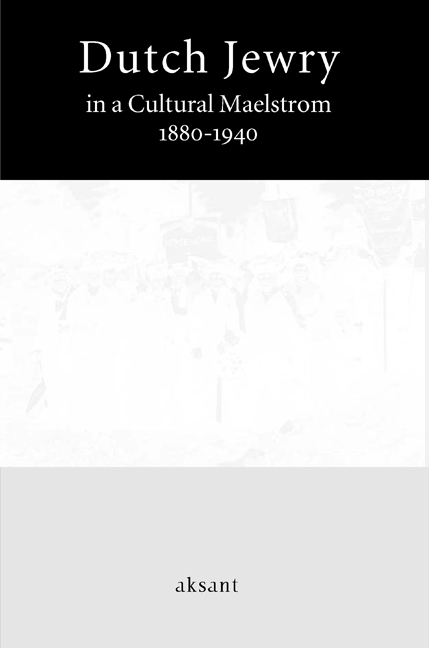Book contents
- Frontmatter
- Contents
- Foreword
- The New “Mosaik”: Jews and European Culture, 1750-1940
- The Politics of Jewish Historiography
- “The First Shall be the Last”: The Rise and Development of Modern Jewish Historiography in the Netherlands Until 1940
- Epigones and Identity: Jewish Scholarship in the Netherlands, 1850-1940
- Judaism on Display: The Origins of Amsterdam's Jewish Historical Museum
- De Vrijdagavond as a Mirror of Dutch Jewry in the Interbellum, 1924-1932
- “Holland is a Country which Provokes Serious Reflection…”: Images of Dutch Jewry in the German Jewish Press
- Spinozism and Dutch Jewry between 1880 and 1940
- Spinoza's Popularity in Perspective: A Dutch-German Comparison
- Mozes Salomon Polak: Jewish “Lerner” and Propagator of Freemasonry, Spiritualism, and Theosophy
- Jewish Women, Philanthropy, and Modernization: The Changing Roles of Jewish Women in Modern Europe, 1850-1939
- Roosje Vos, Sani Prijes, Alida de Jong, and the others: Jewish Women Workers and the Labor Movement as a Vehicle on the Road to Modernity
- Stemming the Current: Dutch Jewish Women and the First Feminist Movement
- Dutch Jewish Women: Integration and Modernity
- Index of Names of Persons
- Index of Subjects
Epigones and Identity: Jewish Scholarship in the Netherlands, 1850-1940
Published online by Cambridge University Press: 26 January 2021
- Frontmatter
- Contents
- Foreword
- The New “Mosaik”: Jews and European Culture, 1750-1940
- The Politics of Jewish Historiography
- “The First Shall be the Last”: The Rise and Development of Modern Jewish Historiography in the Netherlands Until 1940
- Epigones and Identity: Jewish Scholarship in the Netherlands, 1850-1940
- Judaism on Display: The Origins of Amsterdam's Jewish Historical Museum
- De Vrijdagavond as a Mirror of Dutch Jewry in the Interbellum, 1924-1932
- “Holland is a Country which Provokes Serious Reflection…”: Images of Dutch Jewry in the German Jewish Press
- Spinozism and Dutch Jewry between 1880 and 1940
- Spinoza's Popularity in Perspective: A Dutch-German Comparison
- Mozes Salomon Polak: Jewish “Lerner” and Propagator of Freemasonry, Spiritualism, and Theosophy
- Jewish Women, Philanthropy, and Modernization: The Changing Roles of Jewish Women in Modern Europe, 1850-1939
- Roosje Vos, Sani Prijes, Alida de Jong, and the others: Jewish Women Workers and the Labor Movement as a Vehicle on the Road to Modernity
- Stemming the Current: Dutch Jewish Women and the First Feminist Movement
- Dutch Jewish Women: Integration and Modernity
- Index of Names of Persons
- Index of Subjects
Summary
DUTCH JEWISH SCHOLARSHIP – AN EPIGONE TRADITION
According to the prevalent opinion, Dutch Jewry never managed to participate in the Wissenschaft des Judentums. The Wissenschaft, as we know, was an intellectual movement that originated in Germany in the early nineteenth century as an attempt to develop a “national” Jewish historiography, the aim of which was to reconstruct the Jewish cultural past and to forge the resulting narrative into a paradigm of modern Jewish identity. In the course of the century, this intellectual strategy gradually gained ground, in one form or another, in various Jewish centers in Europe and the United States. In one respect common opinion is certainly right in claiming that there were no true manifestations of such a Wissenschaft in the Netherlands. For modern scholarship has stressed the unicity of the German-Jewish condition, and of the ensuing German-Jewish culture that nurtured a uniquely German Wissenschaft des Judentums. Still, it might be worthwhile to challenge one tacit implication of the prevalent opinion's – admittedly somewhat intuitive – claim: the assumption that modern Dutch-Jewish scholarship did not measure up to the standards of the German Wissenschaft (Dutch scholars have been condemned as “appallingly mediocre”) and therefore can only be of limited interest to the modern historian.
I cannot really deny the first part of that assumption. With the possible exception of a few internationally acclaimed scholars such as Marcus Meijer Roest and (the German-born) Sigmund Seeligmann, there have been no Dutch equivalents of scholars like Graetz and Steinschneider (nor for that matter of Solomon Munk and Samuel David Luzzatto, who lived and worked in France and Italy, respectively). Even when compared to the more average international output of the period, publications by Dutch Jewish scholars are in no way memorable. Apart from an unmistakable local relevance, they generally possess little innovative or methodological value that would have made them of interest to the international scholarly community.
Simultaneously, however, one cannot escape the impression that the authors of these modest publications felt quite at ease in the scholarly margin. In this respect they seem to have been true epigones, not in the original derogatory sense of “second rate authors who lack the creative genius of their predecessors”, but rather of men who were happy to follow intellectual examples rather than set the pace, and for whom participating in a scholarly tradition was more important than transforming it.
- Type
- Chapter
- Information
- Dutch Jewry in a Cultural Maelstrom1880-1940, pp. 53 - 66Publisher: Amsterdam University PressPrint publication year: 2008



